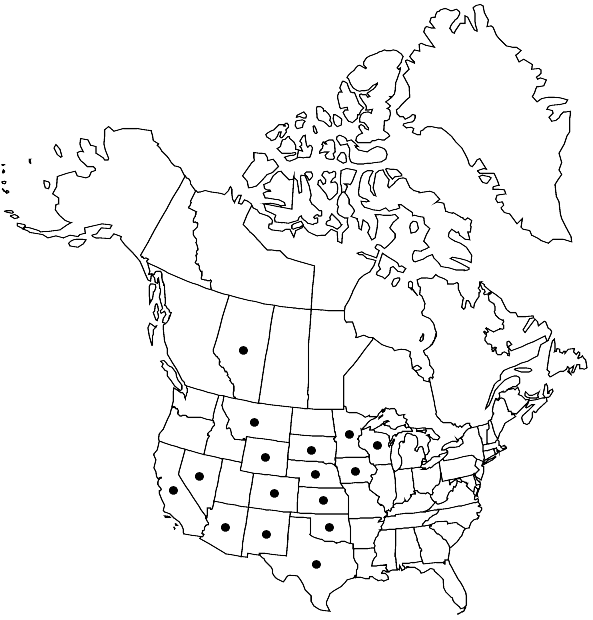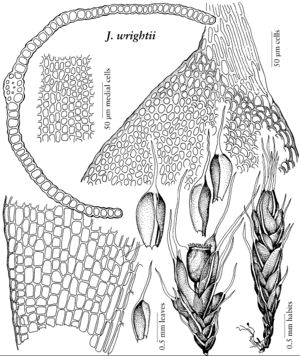Jaffueliobryum wrightii
Rev. Bryol., n. s. 1: 193. 1928,.
Plants in small dense cushions or turfs, yellow-green to dark olivaceous, hoary. Stems 5–15 mm, sparsely branched, julaceous. Leaves crowded, broadly oval to obovate, appressed-julaceous throughout stem, 0.4–0.9 mm excluding awn, apex rounded-obtuse, lamina 1-stratose to rarely 2-stratose in bands, awn length highly variable, 0.2–1.3 mm, hyaline; costa in transverse-section flat, not keeled; proximal cells quadrate to short-rectangular, 12–25 × 10–15 µm, often appearing lax; mid leaf cells oval to irregularly rhomboidal, mostly 1.5–2:1 or more, 7–20 µm; distal cells longer, irregularly elongate-rhomboidal, somewhat hyaline. Sexual condition autoicous or sometimes cryptoicous; perichaetial leaf lamina to 1.3 mm, awn 1.2–2 mm. Seta 0.2–0.4 mm. Capsule yellow-brown turning red-brown with age, ovoid, 0.7–1 mm; operculum short-rostrate, 0.4–0.5 mm.
Phenology: Capsules mature spring–summer depending on elevation.
Habitat: Widespread and locally common on dry sandstone or limestone rock, rarely metamorphic rock, open arid to semi-arid shrub, woodland communities, grasslands
Elevation: moderate to high elevations (typically below 2000 m but ranging from 200-2800 m)
Distribution

Alta., Ariz., Calif., Colo., Iowa, Kans., Minn., Mont., Nebr., Nev., N.Mex., Okla., S.Dak., Tex., Wis., Wyo., Mexico, South America (Bolivia), Asia (China, possibly Kazakhstan, Mongolia, Russia).
Discussion
Jaffueliobryum wrightii is the most widespread species of the genus, extends farther south and west than J. raui in the flora area, and is typically found at somewhat lower elevations in drier and hotter regions than the latter. Because of its unusual disjunct distribution and its calciphile ecology, further studies using ecological, morphological, and DNA data would be of considerable interest. Like J. raui, this species also occurs in the Driftless Area of Iowa, Minnesota, and Wisconsin.
Selected References
None.
